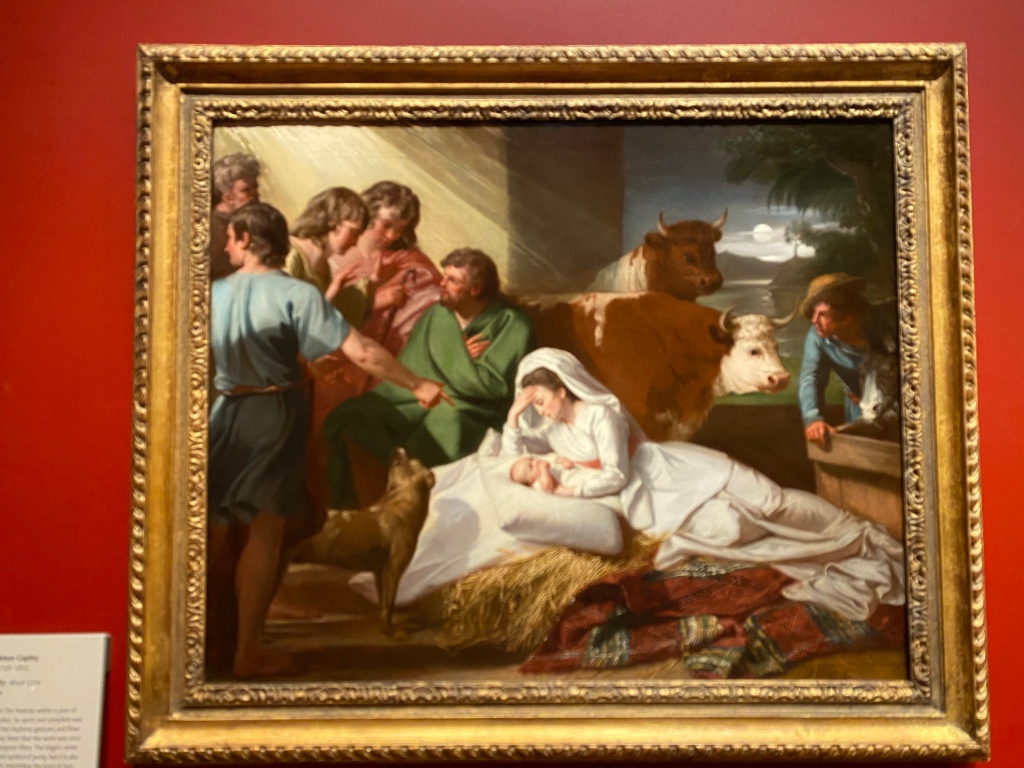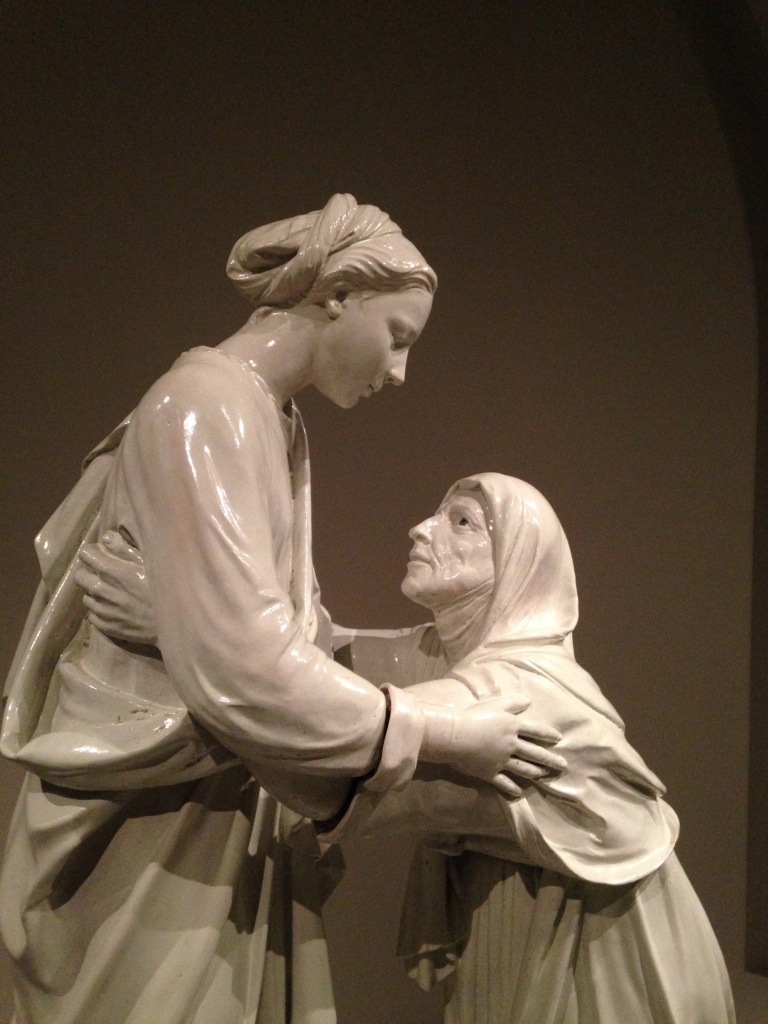How can we try to make humility a practice this Lent?
— Read on www.ignatianspirituality.com/humility-in-lent/
Ignatian Indifference – Ignatian Spirituality
Reposting an article from 2018 or so.
Ignatian indifference is the capacity to let go of what doesn’t help me to love God or love others–while staying engaged with what does. Marina McCoy explains.
— Read on www.ignatianspirituality.com/ignatian-indifference/
Baptism of the Lord, 2022
The Baptism of the Lord is a beautiful celebration. When I read or listen to the passage, I especially notice the words, “You are my beloved Son.” I believe that these words must have been important to Jesus as he started his ministry of teaching, healing, and just being present to people. In his earthly ministry, different people react differently to Jesus. Some are healed and give him praise, some accompany him as friends, some people are confused by him, and some are outright hostile. I wonder whether Jesus himself went back to those words “You are my beloved son” as he encountered these different human reactions in the course of his ministry. In his humanity, did it remind him that his Father’s love was steady and enduring?
Of course, because we share in Jesus’s baptism, these words of love are words for us, too. I wonder, as I reread this, what it would mean to fully know and believe in our own belovedness, the way that Jesus did. Don’t get me wrong; I am not suffering from an especially bad bout of self-esteem! It’s more that I think we can deepen our sense of God’s love for us and our own lovability. This is good both for its own sake and for how it can strengthen the ways that we serve others. Example: I am a teacher. Most of my students seem pretty enthusiastic about being in class, most days. But I have those one or two students who miss a lot of classes. If I were not grounded in a sense of my own lovability, I could make their absences about me, about whether I am respected or loved enough, or a good enough teacher. In reality though, this is almost never the reason.. They are sometimes ill, or struggling with stress, or have a difficult family or roommate situation. It is not “about me”, almost ever. Same goes for that awful driver who felt the need to cut in front of me abruptly on the Jamaicaway, or the time a family member did or didn’t do something the way that I wanted it. I might think it is is about me, but it almost never is.
Paradoxically, if I know, deep in my core, that I am God’s beloved, the way that Jesus surely knew it through and through, it frees me up to stop thinking about myself in kind of self-centered ways. It sets me free to really attend to what others need. Maybe my student needs to be reached out to compassionately, so that we can set up a plan for how to catch up on work, and have a conversation about what is going on. Maybe my family member is feeling tired or anxious, and needs a little TLC. Maybe I can let the actions of a terrible driver, slide off of me. My being loved or respected doesn’t depend on that them; it depends on God alone.
For me, there are two main ways that I can get back in touch with that sense of lovability. The first is to spend time in prayer, and to be in God’s presence, quietly. Prayer is restorative love. A second way is to remember the ways that other people have loved me over the years: my parents, my husband, my family and friends, or even strangers who have gone out of their way to be kind. This is a way of knowing and reconnecting to God’s love, too. Where have you known, you are God’s beloved one? Take time to recollect it, today.
Happy Epiphany 2022
May God bless us this Epiphany as we seek God in all things. May we be like the magi, willing to seek God, able to follow God’s lead down all its winding paths, and generous in our giving. May we also be ready to receive Christ wherever Christ appears to us today.
Happy Christmas!
May your Christmas be blessed with the light of Christ!

John Singleton Copley, MFA
Fourth Sunday in Advent 2021

photo by Marina McCoy
In today’s gospel reading we hear about Mary going to stay with Elizabeth during part of her pregnancy. I love this story about friendship between two women and the ways that they support one another in pregnancy as women have done across different cultures and time periods. The pregnancy also points to the ways in which Christ even in his hiddenness nonetheless shows forth himself. Elizabeth sees that Christ is present in Mary but her recognition arises from her own child leaping in her own womb. Elizabeth, of course, was bearing a child on her own age and yet she must have wondered whether the child was present or viable. I recall with both my own pregnancies the reassurance of feeling my children kicking and moving and how it reminded me that they were still alive and well.
But here the story goes even deeper as it’s the mutual recognition of the other person’s being pregnant, that leads to self-recognition. Elizabeth has a kind of encounter with Christ through Mary—and this helps her also to find what is holy in herself.
The passage leads me to reflect on the following questions which I also invite you to reflect on.
Where have I encountered the living Christ in my own world?
Where have I found that such an encounter enlivens or awakens recognition of something in myself with which I am “expectant”?
Where is Christ present in my current relationships, or in my political community, and where does Christ remain hidden?
Have a blessed Fourth Sunday in Advent!
Finding God in What Is Tender and Small This Season – Ignatian Spirituality
Let us this Advent recollect where we find God in what is tender and small and where we can care for others.
— Read on www.ignatianspirituality.com/finding-god-in-what-is-tender-and-small-this-season/
St John of the Cross Solemnity
Courtesy of the Poetry Foundation:

Third Sunday in Advent
I must confess when I was younger I wondered a lot about the words John the Baptist speaks in the Gospel reading for today. “His winnowing fan is in his hand to clear his threshing floor
and to gather the wheat into his barn,
but the chaff he will burn with unquenchable fire.” It sounded punitive or even violent. Where is the “good news” in that?
But then I learned more about farming. Wheat has different parts to it of different weights or heaviness. The edible grain is heavier while the outer chaff is lighter, so by winnowing , a farmer can basically allow wind to do the work, after threshing the grain where the chaff sometimes can simply blow away on its own. The chaff is the part that’s not needed. If it doesn’t just blow away one can dispose of it through burning.
As is often the case, Jesus doesn’t fully explain his metaphor. But for me it resonates with Advent and its business. For me as a professor, Advent also always coincides with one of the busiest academic seasons of the year, when I have a huge amount of grading and dissertation defenses to do, letters of recommendation to write for my grad students, and then the Christmas related tasks around my house, gifts for family to buy, cards to write. The trouble is that none of it is chaff, a lot of it is good grain. I imagine it is the same for others at Advent and Christmas time—-lots to do that is seasonal on top of the usual of work, housecleaning, leaf or snow cleanup, and the like.
I have no solution to the problem, really, except to try to focus on my tasks at the moment, carve out some time in the early morning for prayer, and make sure there’s time to be celebratory, too, The “good grain” of life really is what the reading from Phillipians recommends:
“Rejoice in the Lord always.
I shall say it again: rejoice!
Your kindness should be known to all.
The Lord is near.
Have no anxiety at all, but in everything,
by prayer and petition, with thanksgiving,
make your requests known to God.”
The other night my husband and I had been feeling slightly under the weather for a couple of days but recuperated and got our negative COVID results. We were able to go out to downtown Boston and a winter market, filled with Christmas lights. Just taking in the sights of multicolored lights, people out having fun, munching on an avocado taco from a food truck, and walking through a great hall to see various small business vendors felt pretty celebratory.
Of course we also can have anxiety—what will omicron hold for the area when it gets going here? Will it be worse or better than Delta? Will the booster I got in late October work in February and March? A degree of caution is healthy: we don’t want to live in a fantasy world where we wish masks were unnecessary so never wear them, or where Christian trust in God replaces the good sense of following the recommendations of epidemiologists to get a booster and mask up in public.
Surely we must care for the well being of people who are more vulnerable from the virus—I think about my mom who is older and whom I’ll be visiting soon. Finding the grain in the chaff requires good discernment and good discernment is practical and grounded in reality, not a fantasy of what we wish were true.
But at the end of the day, we have also to let the chaff fly away, or burn it if need be—that is, let go of the stuff that gets in the way of joy. Not a false joy of an ideal world that we wish it were, but joy in the real one. Where is God with us, right here, right now, no matter what else is happening?
My husband and I heard just a bit of Christmas carolers when out in Boston at SOWA markets Winter Festival last night. Our son and his girlfriend were with us and I took joy in how much they were enjoying some local donuts. Sometimes it’s the simple things—almost always it’s the simplest and most ordinary things—about which we can rejoice.
Second Sunday in Advent 2021
When I hear the words in today’s Gospel column: “Every valley shall be filled, and every mountain and hill shall be made low. The winding roads shall be made straight, and the rough ways made smooth” (Luke 3:5), I think of a pilgrimage trip from years ago. Several years ago, a small group of BC faculty went on the last 100 miles or so of the Camino to Santiago de Compostela in Spain. Every day we would walk about 12-16 miles, carrying everything that we had for our trips with us on our backs. It was hard work to walk that long. Most of us developed blisters and all of us had some sort of ache or pain. Every morning, one of the other faculty members who had done the walk many times would announce to the rest of us that the day ahead was not quite as hilly as the previous day had been. “This part is pretty level compared to yesterday,” he would say. Then we’d go out and find that while for a short part of the path, it might be true. Somehow there always seemed to be some kind of hill that went up and up and up and …..”It has a down eventually, doesn’t it?,” I would think ,while trying hard to pray and not to grumble to myself about my sore feet! Of course, eventually the way did get smoother and we were very grateful.
Now that some time has passed, I’ve come to realize that a good deal of lengthy travel in the ancient world was probably very much like my pilgrimage experience: hard work, mostly on foot. There were probably many people like me who wondered, when will this hill end? When do we get to the easier part? I can well imagine Isaiah, the prophet that Luke is quoting here, inspiring hope in people at his time, the way that my faculty colleague tried to encourage us: “Today, the path will become smooth and level. Yesterday was hard, but tomorrow will be an easier day!”
When we look at our world, problems of racism, the pandemic, concerns about the right treatment of immigrants, or the need to respect all people, there is no doubt that the road ahead has some uphill portions. But hope is necessary. In my classes recently, I had my students watch a video by Fr Michael Himes, on hope, and we briefly read Aquinas’s ideas about hope together. Hope, Fr Himes says, is different than optimism or mere wishful thinking. It is the belief that what we do matters and is meaningful even if tomorrow has challenges. Aquinas says that hope is the continued wanting or desiring of things not yet possessed. There is a spirit in hope of belief in the good and even belief in the basic goodness of other people. And so rather than give up desiring what we desire, we can ‘stay with’ our hope because of this sense that our words and our actions do matter.
Luke and the earlier prophets promised us that the road ahead was better ,not only because of WHAT we can hope for, but because of WHO we can hope for: Jesus. John the Baptist was the prophet in Luke’s time who pointed ahead to the coming of the Christ, to the coming of Jesus.
For us in our age, Jesus is already here. Jesus is with us in Eucharist and in the Scripture. Jesus is with us when we pray, and when we gather in community. God is already here. We don’t have to wait for our savior to be born. So what, then, is Advent about for us?
For me, Advent is about redirecting my own heart to Jesus and letting it be a time let God into my life more deeply. How can I also preach hope and comfort to others, for whom the road seems tough now, the way that God has given me hope and comfort in the past when life’s ups and downs were arduous?
For me, this means at least two things slowing down at one of the seasons when life is busiest. It also means “discerning what is of value,” a phrase that we hear in today’s reading from Philippians. Discerning requires choosing between different goods, and where to focus my energy, with hope. It means especially focusing on the love of God and the love of one another–a love where no one is excluded from kindness, care and justice.
Let’s use this Advent not to speed up life before Christmas, but to slow down, to prepare to let God “in” on our lives, and to join God in being hope and comfort to others, too, to work for justice hopefully, and to receive that hope from our God, who promises us that the way will be smoother ahead, because of Jesus’s love for us.